|
| NEWS |
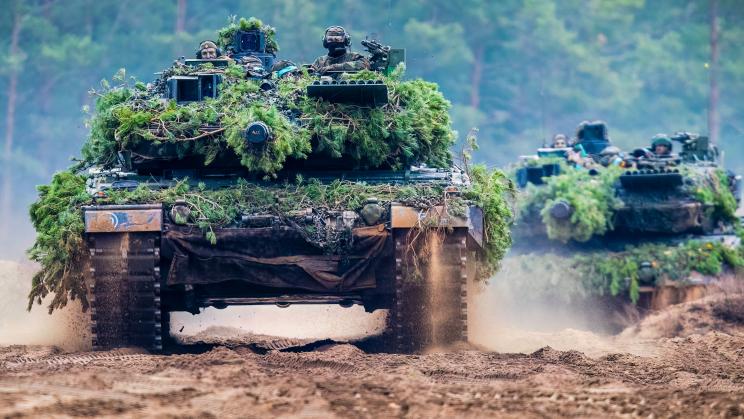 |
| New SIPRI data on international arms transfers |
|
This month SIPRI released new data on international arms transfers. The new data revealed that imports of major arms by European states increased by 47 per cent between 2013–17 and 2018–22, while the global level of international arms transfers decreased by 5.1 per cent. Arms imports fell overall in Africa (–40 per cent), the Americas (–21 per cent), Asia and Oceania (–7.5 per cent) and the Middle East (–8.8 per cent)—but imports to East Asia and certain states in other areas of high geopolitical tension rose sharply. The United States’ share of global arms exports increased from 33 to 40 per cent while Russia’s fell from 22 to 16 per cent.
|
|
|
Read more | Download the SIPRI Fact Sheet
|
|
|
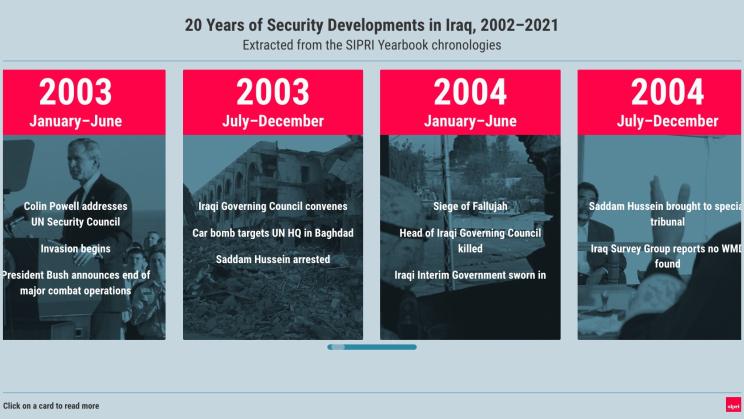 |
| New materials to mark the 20th anniversary of the invasion of Iraq |
|
To mark the 20th anniversary of the invasion of Iraq, SIPRI has released a collection of new materials looking back over the months leading up to Operation Iraqi Freedom and developments over the two decades since. The package contains: an interactive chronology of security-related developments in Iraq, drawing from the SIPRI Yearbook archive; a SIPRI Topical Backgrounder presenting 20 years of SIPRI data on Iraq; video interviews with central figures in United Nations organizations that operated in Iraq in the 1990s and the months leading up to the invasion; a SIPRI Essay by a member of the International Atomic Energy Agency (IAEA) Action Team who investigated renewed claims about an Iraqi nuclear weapons programme in 2002–2003; and a SIPRI Topical Backgrounder that presents a snapshot of the situation and remaining challenges for Iraq, two decades after the invasion.
|
|
|
Read more
|
|
|
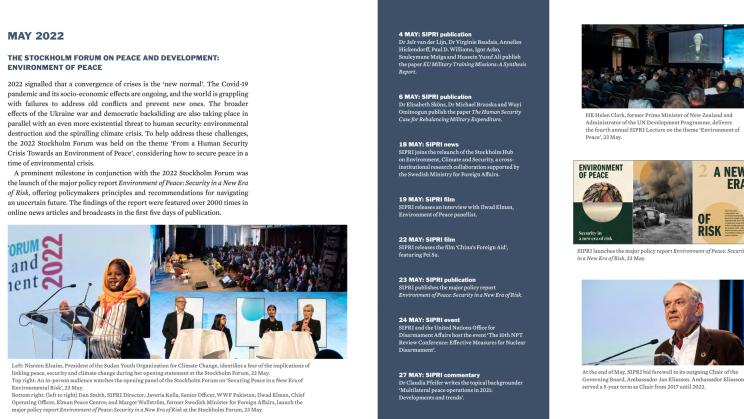 |
| SIPRI releases its Annual Review 2022 |
|
SIPRI is pleased to release its Annual Review 2022, which takes a retrospective look at the Institute’s activities, achievements, publications, commentaries, events and news. Throughout 2022, SIPRI continued to play a crucial role in the global dialogue on managing risks and promoting peace at a time when parallel crises of insecurity and environmental deterioration challenge global stability. The situation in Ukraine and the depth and breadth of environmental challenges are powerful reminders of the magnitude of the task at hand.
|
|
|
Read more | Download Annual Review 2022
|
|
|
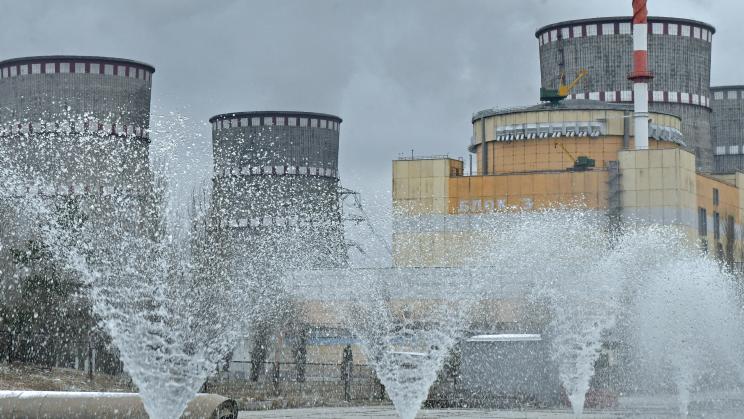 |
| Nuclear Security During Armed Conflict: Lessons From Ukraine |
|
On 16 March, SIPRI co-hosted an event on the attacks on nuclear installations in Ukraine by the Russian military in 2022 and the threat that they pose to the international nuclear security framework. The event was held both in-person and online and gathered an audience of over 80 participants. It was moderated by Vitaly Fedchenko, SIPRI Senior Researcher, and co-hosted by the Odesa Center for Nonproliferation (ODCNP) and the Maltese Ministry for Foreign and European Affairs and Trade.
|
|
|
Read more
|
|
|
 |
| SIPRI Conversations on Iraq |
|
This month, SIPRI released interviews in its Conversations video series with two Distinguished Associate Fellows. The first video features Ambassador Rolf Ekéus who was Executive Chairman of the UN Special Commission (UNSCOM) in Iraq during 1991–97. In this interview, Ambassador Ekéus reflects on the 2003 invasion of Iraq and the legacy of UNSCOM. The second video is an interview with Dr Hans Blix, who was the Executive Chairman of the UN Monitoring, Verification and Inspection Commission from 2000 to 2003. In this interview, Dr Blix reflects on the experience of the critical months leading up to the invasion and the lessons it offers today.
|
|
|
Watch the SIPRI Conversations Playlist | Watch the interview with Ambassador Ekéus | Watch the interview with Dr Blix
|
|
|
 |
| SIPRI Spotlight with Dr Geoff Dabelko |
|
As part of the Environment of Peace initiative, SIPRI interviewed Dr Geoff Dabelko, Professor at the Voinovich School of Leadership and Public Service at Ohio University and Associate Senior Fellow at SIPRI. In this SIPRI Spotlight interview, Dr Dabelko speaks about the needed transition towards sustainability and climate resilience, what the transition entails and the challenges to making that happen.
|
|
|
Watch the video
|
|
|
|
| COMMENTARY |
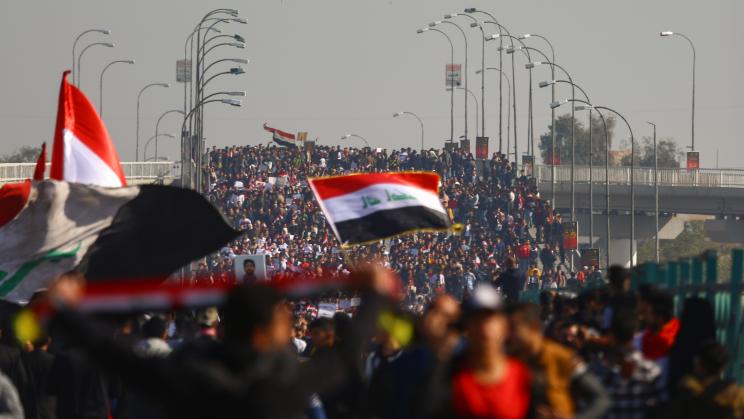 |
| Iraq in 2023: Challenges and prospects for peace and human security |
|
Over the past two decades Iraq has been affected by several waves of intense conflict and violence. The 2003 invasion of Iraq by a multinational coalition led by the USA and United Kingdom toppled the Ba’athist regime of Saddam Hussein. It also ushered in years of chaos and civil war, as a variety of armed groups vied for power and territory and targeted coalition forces and the fledgling post-Ba’athist Iraqi Army. Today Iraq is enjoying its most stable period since 2003. Armed violence persists in different forms, but it is sporadic, fragmented and localized. However, the country remains fragile and divided. This Topical Backgrounder aims to provide a snapshot of the situation in Iraq 20 years since the invasion.
|
|
Read the SIPRI Topical Backgrounder
|
|
|
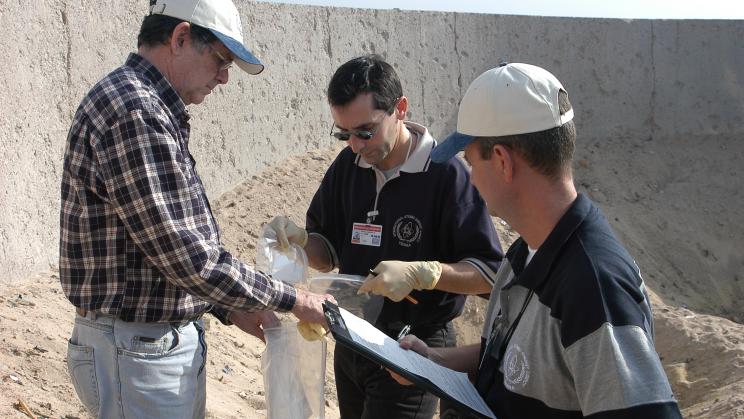 |
| Twenty years ago in Iraq, ignoring the expert weapons inspectors proved to be a fatal mistake |
|
The case for invading Iraq in March 2003 was built on three basic premises: that Iraq had weapons of mass destruction (WMD); that it was developing more of them; and that it was failing to comply with its disarmament obligations under a series of UN Security Council resolutions. All of these premises were based on scraps of unreliable information. None of them was true. This SIPRI Essay is written by a former member of the IAEA Action Team who investigated renewed claims about an Iraqi nuclear weapons programme in 2002–2003.
|
|
Read the SIPRI Essay
|
|
|
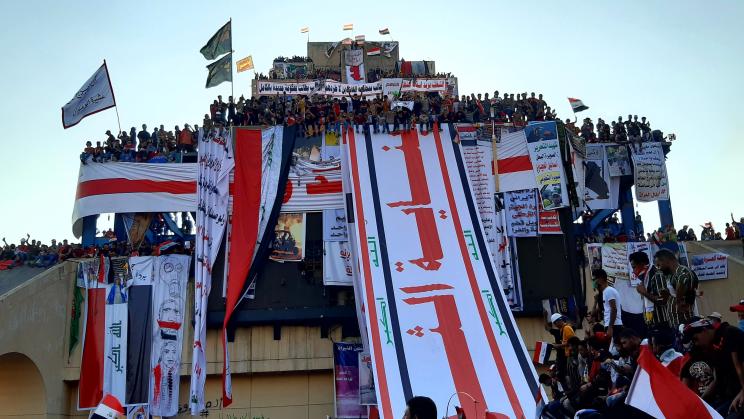 |
| Iraq since the invasion: 20 years in SIPRI data |
|
On 20 March 2003, a massive multinational coalition force invaded Iraq under Operation Iraqi Freedom. After three weeks of an intensive air and ground campaign, the Iraqi capital, Baghdad, fell, and with it Saddam’s Ba’athist regime. Shortly afterwards, the Coalition Provisional Authority decided to disband the Iraqi Army. No WMDs were ever found. This SIPRI Topical Backgrounder presents data for Iraq drawn from four SIPRI databases’ data covering the period since the invasion, and what it reveals about developments in the country since the invasion.
|
|
Read the SIPRI Topical Backgrounder
|
|
|
 |
| Going private (equity): A new challenge to transparency in the arms industry |
|
Private equity firms invest capital raised from private investors. They use these funds to acquire stakes—often controlling ones—in other companies, with the aim of increasing the acquired company’s value and selling it on for a profit. Unlike public companies, private equity firms in the USA are not registered with the governmental financial watchdog, the Securities and Exchange Commission, and are not required to publish annual reports on or submit financial statements for any of the companies in their portfolios. This SIPRI WritePeace Blog explores the increasing trend for private equity deals in the arms industry in the USA—the country with the largest number of companies in the SIPRI Top 100—and the implications for transparency.
|
|
Read the SIPRI WritePeace Blog
|
|
|
|
|
|
 |
| External articles |
|
The following articles by SIPRI experts were recently published:
|
|
|
| UPCOMING EVENTS |
| |
| 2–5 May 2023 |
| SIPRI to co-host WMD Non-Proliferation and Disarmament Pathways Course |
|
SIPRI and the European Union Non-Proliferation and Disarmament Consortium (EUNPDC) are pleased to host a second instalment of the intensive introductory course on the proliferation of WMDs, mechanisms to control their further spread and pathways to disarmament. The course will be instructed by renowned experts on WMD non-proliferation, arms control, disarmament, export controls, verification and related subjects from SIPRI, other European research centres, think tanks and international organizations.
|
|
Read more
|
| |
| 28–30 June 2023 |
| SIPRI to co-host the 26th Annual International Conference on Economics and Security |
|
SIPRI and the Swedish Defence Research Agency are pleased to host the 26th Annual International Conference on Economics and Security. The conference aims to provide an opportunity for economists, political scientists and others from around the world to share ideas and discuss future developments.
|
|
Read more
|
| |
| 21–25 August 2023 |
| SIPRI to co-host 2023 Armament and Disarmament Summer School |
|
SIPRI and the Alva Myrdal Centre for Nuclear Disarmament at Uppsala University are pleased to host the 2023 Armament and Disarmament Summer School. The Armament and Disarmament Summer School is both a course and a networking opportunity for the next generation of professionals in the fields of disarmament, non-proliferation and arms control, aimed at supporting and reinvigorating disarmament education activities.
|
|
Read more
|
|
| RECENT EVENTS |
| |
| 15 March 2023 |
| International Arms Trade in a Time of Global Upheaval |
|
The war in Ukraine has caused a dramatic acceleration of arms transfer decisions in Europe and the USA, which is taking place alongside other dynamics affecting the supply of major arms worldwide. SIPRI and the Stimson Center hosted a virtual event to discuss recent trends in international arms transfers and their implications. The event showcased newly released SIPRI data, examined the interrelation between global arms trade dynamics and world events, and considered the consequences for global peace and security and international relations.
|
|
Read more
|
| |
| 14–15 March 2023 |
| SIPRI co-hosts event on Regional Project Development Within the Climate–Energy–Health–Nexus: Sustainability in West Asia and the Arabian Peninsula |
|
On 14–15 March, SIPRI, the Center for Applied Research in Partnership with the Orient and the Gulf Research Center Foundation hosted a workshop on ‘Regional Project Development within the Climate–Energy–Health–Nexus: Sustainability in West Asia and the Arabian Peninsula’. The event was held at SIPRI and brought together a group of academic and technical experts, representatives from regional and international donor organizations as well as experts in peace, development and climate action sectors.
|
|
Read more
|
| |
| 13 March 2023 |
| SIPRI co-hosts roundtable on climate, peace and security in Afghanistan |
|
On 13 March, SIPRI and the Norwegian Institute of International Affairs held a closed online roundtable focused on climate, peace and security in Afghanistan since 2021. The roundtable brought together experts, practitioners, policymakers and member state representatives to discuss the challenges Afghanistan is facing due to climate-related change.
|
|
Read more
|
|
| STAFF NEWS |
SIPRI is currently accepting applications for:
- Senior Researcher, Governance of Artificial Intelligence Programme (Closing date: 26 March).
- Research Assistant, Governance of Artificial Intelligence Programme (Closing date: 26 March).
- Researcher, Arms Transfers Programme (Closing date: 22 March).
|
|
Read more
|
|
|
| PUBLICATIONS |
 |
| No Exit, Without an Entry Strategy: Transitioning UNMISS SSR Activities |
|
This report looks at the transition of the UN Mission in South Sudan’s (UNMISS) security sector reform (SSR) activities to international and national actors. Many required SSR activities in South Sudan remain at a very early stage. Four main challenges must be overcome if the SSR process and UNMISS transition are to become sustainable: (a) the political process is weak with no national consensus or genuine interest regarding SSR; (b) the implementation of the cease-fire arrangements and SSR are not yet part of a broader recovery context, including disarmament demobilization and reintegration (DDR); (c) donors are reluctant to funding the South Sudanese SSR and DDR processes; and (d) the principles of good governance and gender-responsiveness are not yet sufficiently embraced.
|
|
Read the SIPRI Research Policy Paper
|
|
|
 |
| Nuclear Security in Ukraine and the Black Sea Region: New Threats, New Risks, New Consequences |
|
In 2022 the Russian military attacked Ukrainian nuclear facilities. The Ukrainian nuclear security regime began to adapt, shifting focus to protecting nuclear installations in extraordinary circumstances. Black Sea states began to recognize Ukrainian territories affected by armed conflict as a source of nuclear security risks. This paper focuses on the special challenges that arise from dealing with nuclear security threats in extraordinary circumstances. It is based on SIPRI’s continuity of knowledge on the subject of nuclear security in the Black Sea region, including an extensive 18-month research project.
|
|
Read the SIPRI Research Policy Paper
|
|
|
 |
| Nuclear Security During Armed Conflict: Lessons From Ukraine |
|
The attacks on nuclear installations in Ukraine by the Russian military in 2022 were unprecedented. Nuclear security aims at prevention, detection and response to malicious or unauthorized acts by non-state actors, not the armed forces of a state. However, an international armed conflict creates new circumstances in which a national nuclear security regime must operate. This paper highlights gaps in the current nuclear security regime and recommends how those gaps can be filled.
|
|
Read the SIPRI Research Policy Paper
|
|
|
 |
| Trends in International Arms Transfers, 2022 |
|
Imports of major arms by European states rose by 47 per cent between 2013–17 and 2018–22, while the global volume of international arms transfers fell by 5.1 per cent. There were decreases in arms transfers to Africa (–40 per cent), the Americas (–21 per cent), Asia and Oceania (–7.5 per cent) and the Middle East (–8.8 per cent) between the two periods. The five largest arms importers in 2018–22 were India, Saudi Arabia, Qatar, Australia and China. The five largest arms exporters were the USA, Russia, France, China and Germany. This SIPRI Fact Sheet presents global trends in arms exports and arms imports, and highlights selected issues related to transfers of major arms.
|
|
Read the SIPRI Fact Sheet
|
|
|
 |
| Naval Incident Management in Europe, East Asia and South East Asia |
|
Unprecedented global turbulence in 2022 has demonstrated the need to pay increased attention to naval operations. Enhanced military capability allows naval power projection far beyond home waters. New threats and challenges are emerging from technological advances and new applications, not least the vulnerability of warships and naval facilities to cyber intrusions and cyberattacks. As states implement the programmes they need to protect and promote their interests at sea, there is also likely to be an increase in the number of close tracking incidents. How effective current risk reduction mechanisms will be at dealing with incidents at sea is unclear. This Insights Paper provides a preliminary assessment of the existing mechanisms and suggests areas for further improvement.
|
|
Read the SIPRI Insights on Peace and Security
|
|
|
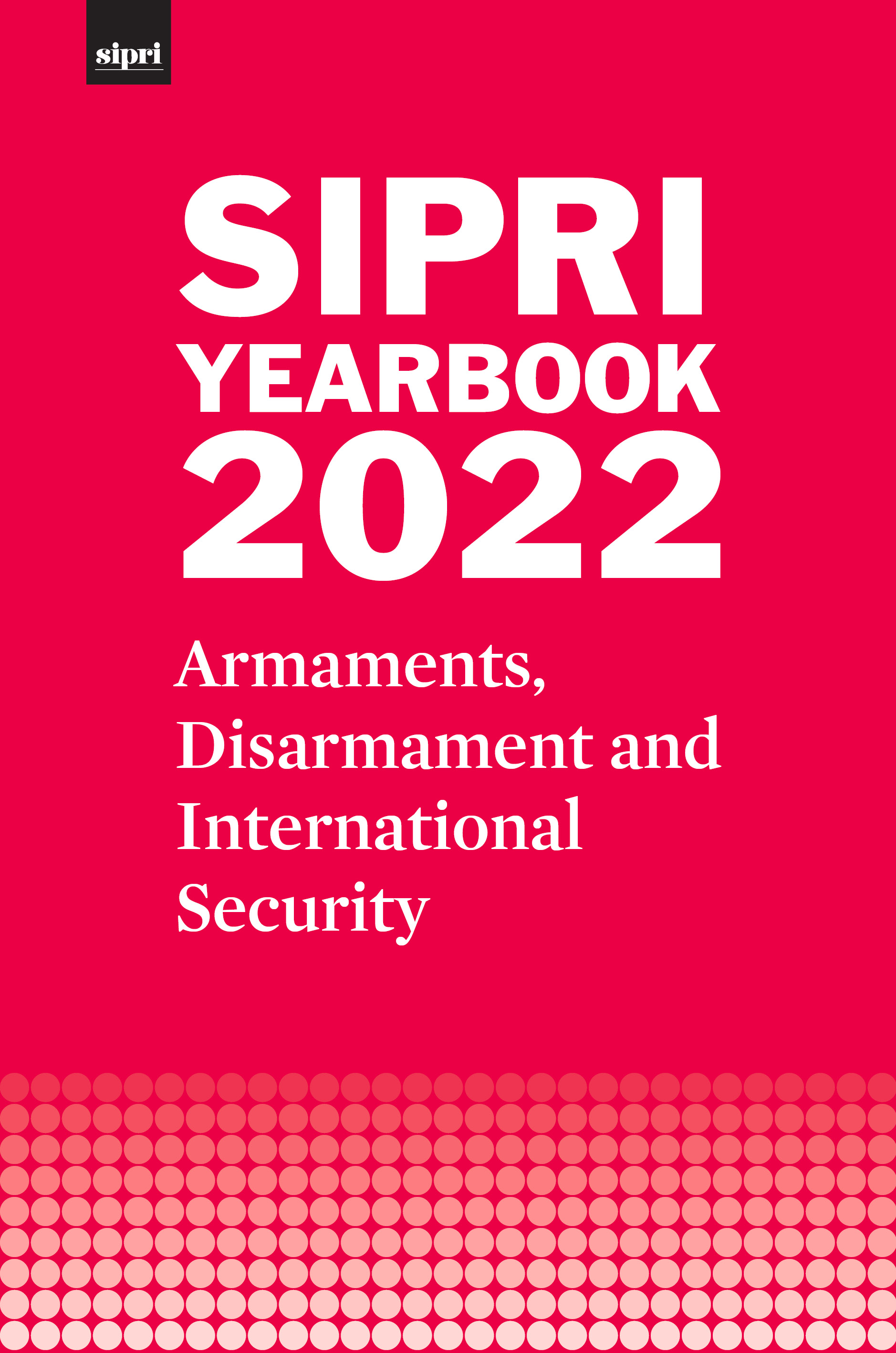 |
| SIPRI Yearbook 2022 |
SIPRI Yearbook 2022 presents a combination of original data in areas such as world military expenditure, international arms transfers, arms production, nuclear forces, armed conflicts and multilateral peace operations with state-of-the-art analysis of important aspects of arms control, peace and international security. In addition to its detailed coverage of nuclear arms control and non-proliferation issues, the latest edition of the SIPRI Yearbook includes
- insight on developments in conventional arms control in 2021;
- regional overviews of armed conflicts and conflict management;
- in-depth data and discussion on military expenditure, international arms transfers and arms production; and
- comprehensive coverage of efforts to counter chemical and biological security threats.
|
|
Browse the contents page | Download the summary (PDF) | Download the sample chapter on world nuclear forces (PDF) | Order SIPRI Yearbook 2022
|
|
|
| |
|
|
|
|
|
|
|
|
|